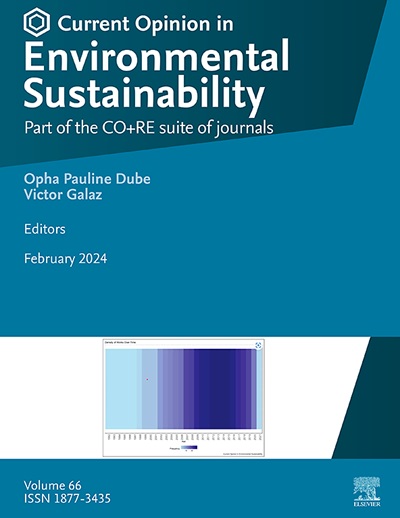跨文化网络加深了可持续性教育变革的学习:共同设计跨学科国际学习实验室的经验教训
IF 6.3
2区 环境科学与生态学
Q1 ENVIRONMENTAL SCIENCES
Current Opinion in Environmental Sustainability
Pub Date : 2025-08-29
DOI:10.1016/j.cosust.2025.101567
引用次数: 0
摘要
在本文中,我们强调了研究人员、学生和从业者共同创造和提供跨学科可持续学习机会的跨文化网络的价值。该网络名为跨学科教育合作促进可持续发展转型(TRANSECTS),是与加拿大、德国和南非的中心大学建立的南北伙伴关系。在这里,我们介绍了一种学习途径——跨学科国际学习实验室(TILLs)——这是一种在联合国教育、科学及文化组织(教科文组织)指定的生物圈保护区/地区进行的沉浸式学习体验。我们描述了通过跨国家和学科界限的合作来设计、交付和评估这种新颖的可持续教育形式所获得的初步经验教训。在跨学科学习转型框架的基础上,我们解释了til如何促进学生、共同设计和实施它们的学者和实践者的单、双、三环学习。我们将这些经验分享给其他寻求提供变革性可持续教育的实验室模型。本文章由计算机程序翻译,如有差异,请以英文原文为准。
Intercultural networks deepen learning for transformative sustainability education: lessons from co-designing transdisciplinary international learning labs
In this paper, we emphasize the value of an intercultural network of researchers, students, and practitioners engaged in co-creating and delivering transdisciplinary sustainability learning opportunities. The network, the Transdisciplinary Education Collaboration for Transformations in Sustainability (TRANSECTS), is a north–south partnership with hub universities in Canada, Germany, and South Africa. Here, we introduce one pathway for learning — Transdisciplinary International Learning Labs (TILLs) — which are immersive learning experiences that take place in the United Nations Educational, Scientific and CulturalOrganization (UNESCO)-designated Biosphere Reserves/Regions. We describe preliminary lessons learned through collaborating across national and disciplinary boundaries to design, deliver, and evaluate this novel sustainability educational format. Drawing on a framework for transformative transdisciplinary learning, we explain how TILLs have contributed to single, double, and triple loop learning by students and the academics and practitioners who co-design and implement them. We share these lessons to inform other lab models that seek to provide transformative sustainability education.
求助全文
通过发布文献求助,成功后即可免费获取论文全文。
去求助
来源期刊

Current Opinion in Environmental Sustainability
ENVIRONMENTAL SCIENCES-ENVIRONMENTAL SCIENCES
CiteScore
13.80
自引率
2.80%
发文量
52
审稿时长
6-12 weeks
期刊介绍:
"Current Opinion in Environmental Sustainability (COSUST)" is a distinguished journal within Elsevier's esteemed scientific publishing portfolio, known for its dedication to high-quality, reproducible research. Launched in 2010, COSUST is a part of the Current Opinion and Research (CO+RE) suite, which is recognized for its editorial excellence and global impact. The journal specializes in peer-reviewed, concise, and timely short reviews that provide a synthesis of recent literature, emerging topics, innovations, and perspectives in the field of environmental sustainability.
 求助内容:
求助内容: 应助结果提醒方式:
应助结果提醒方式:


